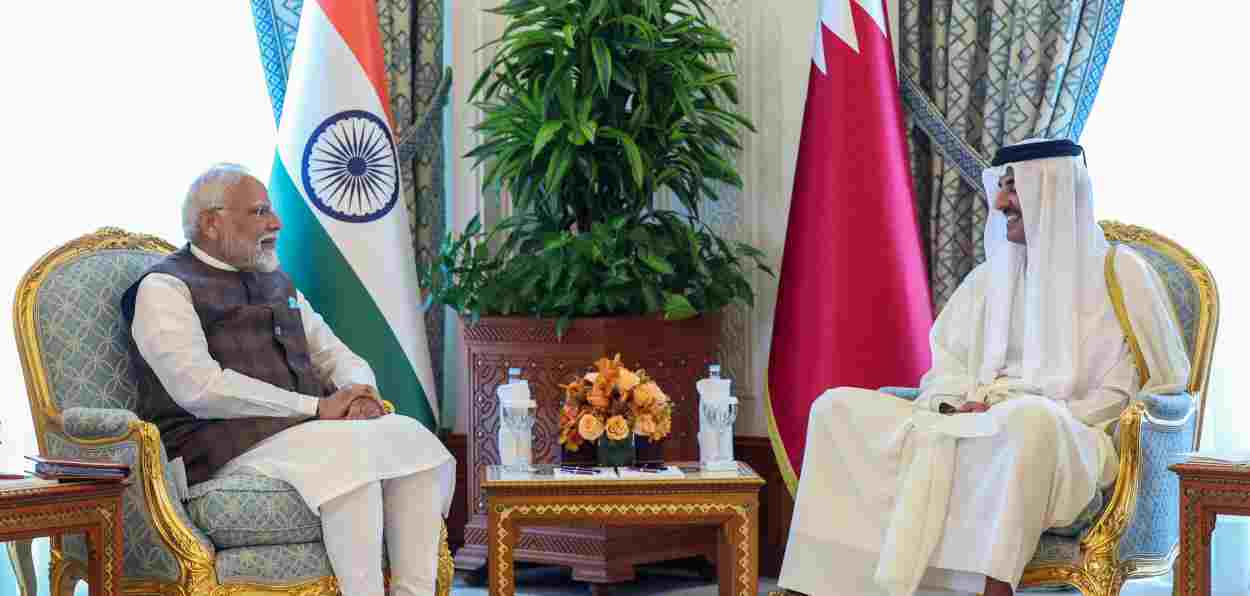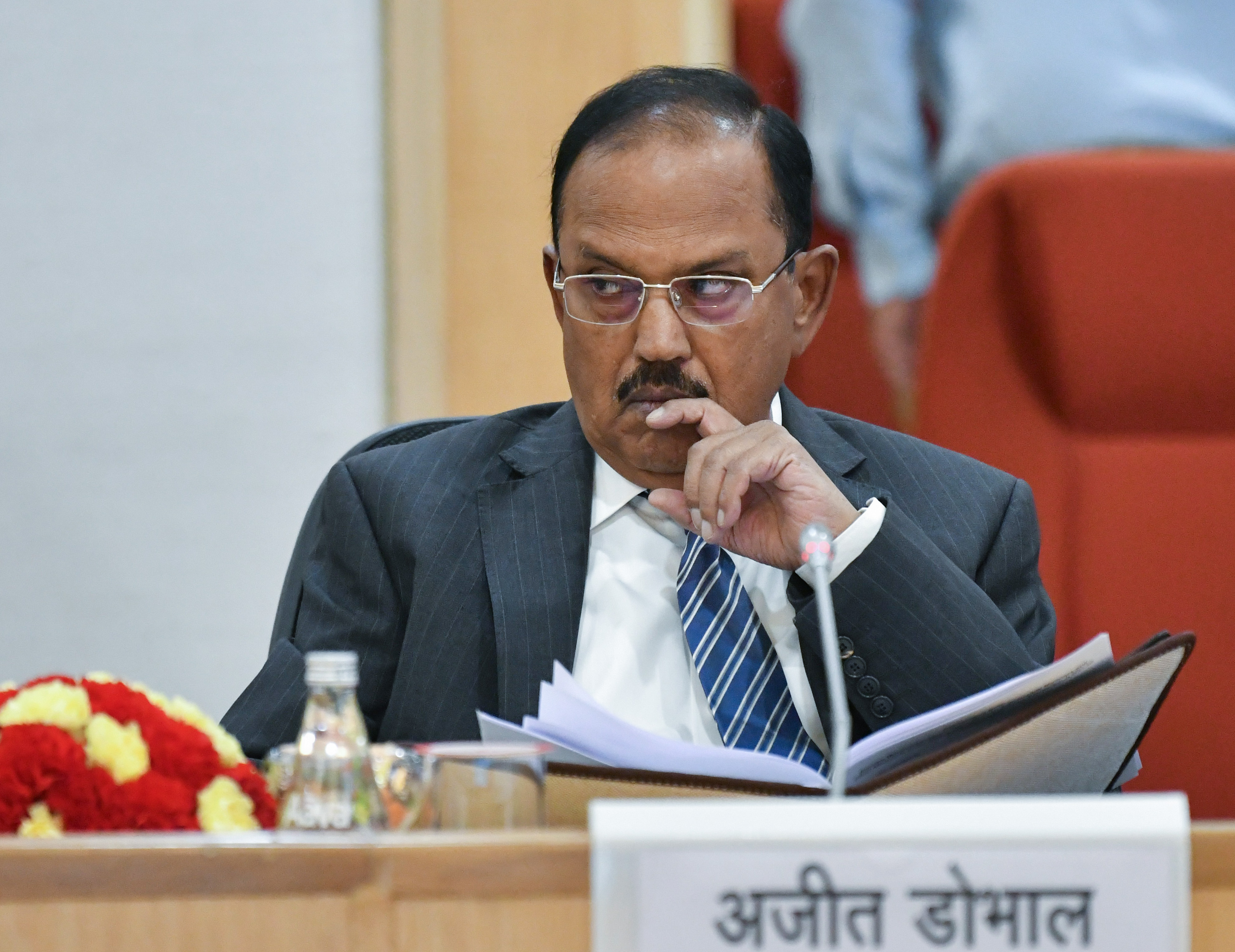
Aditi Bhaduri
The recent return of the Indian Navy retired personnel from Qatar is yet another demonstration that India is no push-over, (in case anyone thought it was). And that unity is our strength for it was a joint diplomatic and security endeavour, facilitated by the top leadership in both countries.
First, a recap is due. News suddenly broke in August 2022 that eight retired personnel of the Indian Navy had been arrested in Qatar on charges of espionage for Israel. The charges were not made public then, and neither have they been made public now. Nevertheless, they seemed absurd and far-fetched. In their more than centuries-old engagement with the Gulf region, Indians have been known, if anything, for their industriousness, (which in no small measure contributed to turning the deserts into glittering oases of affluence), entrepreneurship, and wisdom. More than a year later, on 26 October 2023, news broke that the eight had been sentenced to death. They were: Captain Navtej Singh Gill, Captain Birendra Kumar Verma, Captain Saurabh Vasisht, Commander Amit Nagpal, Commander Purnendu Tiwari, Commander Sugunakar Pakala, Commander Sanjeev Gupta, and Sailor Ragesh. All of them were employed by Dahra Global, a company working on the induction of stealth submarines into the Qatari Navy.
The news was met with huge shock and disbelief in India, more so as bilateral relations between India and Qatar were dualistic: excellent trade and people-to-people ties but, with a simultaneously problematic approach in social matters. For instance, during the Nupur Sharma controversy, Qatar took the lead in hurling charges of Islamophobia against India, summoning the Indian ambassador to Doha, and even demanding an apology. Yet, Qatar extended citizenship to later painter M.F. Hussein, who was charged by millions of Hindus with the same accusation that Qatar had pointed at India – hurting the religious sentiments. More recently Islamist preacher Zakir Naik wanted by India on terrorism abutment charges was allowed a platform by Qatar to preach during the FIFA World Cup that Qatar hosted publicly. Al Jazeera English Channel, a geopolitical tool of Qatar engages in regularly negative coverage of India.
 The conspicuous personal chemistry between Narendra Modi and the Emir of Qatar
The conspicuous personal chemistry between Narendra Modi and the Emir of Qatar
The trial conducted by Qatar's Court of First Instance was opaque. Technically, their sentence could be appealed and the Indian embassy in Doha extended support to reach out to top legal experts in Qatar to appeal the sentence in the higher court. Simultaneously, India also pursued a mercy petition to the Emir of Qatar, who had the right to pardon. The return of the seven servicemen is believed to be a result of such a pardon, which came as a result of vigorous follow-up from India on numerous fronts.
First, the chemistry between Prime Minister Narendra Modi and Qatari Emir Tamim bin Hamad Al Thani is undeniable. Indeed, while the Western world has not tired of screaming hoarse about minority oppression in India, the Middle East is one region where Modi has staged spectacular success. In what is probably his last official visit in this current tenure as prime minister he chose to visit the UAE and Qatar. Vinay Kwatra, the spokesperson for the Ministry of External Affairs, expressed gratitude to the Qatari Emir for his "decision " to "release" the servicemen, and said Prime Minister Modi had "himself personally constantly supervised all the developments in this case." Indeed, Modi had met Al Thani in Dubai in December last year at the COP 28 summit, following which the death sentence was reversed. Finally, on 12 February 2024 without any media fanfare, seven of the sailors returned to India while the modalities for the eighth released personnel were being worked out.
 India's National Security Advisor Ajit Doval
India's National Security Advisor Ajit Doval
At the same time, India is also a source of many consumer items for Qatar. Let us not forget that when fellow Gulf Cooperation Council (GCC) members imposed a blockade on Qatar, India helped airlift food products and other supplies to it. There is cooperation in defense between the two countries with Qatari military personnel undergoing training in India.
All this cooperation suddenly came under a question mark as India sought the release of its citizens, in an election year, no less.
Coincidently, on 5 February, the agreement extending the LNG contract for importing 7.5 million tons of LNG (liquefied natural gas) annually for an estimated $78 billion was signed between India's Petronet-LNG and Qatar Energy. PM Modi also paid a visit to Qatar after the release of all eight Indians and the bonhomie between the two leaders was on full show.
The veterans’ episode is also connected to the larger picture in the Middle East. The Hamas-Israel war has put Qatar on the back foot. The 7th October attacks by Hamas in Israel have spotlighted Qatar's role in maintaining ties with radical and militant groups. Qatar hosts the office of Hamas in Doha, where the leadership of Hamas was when the attacks occurred. Its cash transfers estimated to be to the tune of $ 2 billion to Gaza have helped prop up the Hamas there. Designated a major non-NATO ally, and which hosts the US Central Command at its Al Udeid air base, Qatar has engaged in mediation on many fronts in recent times. Since 2012 Qatar allowed the Taliban to open a representative office in Doha and helped broker the Doha Accords between the US and Taliban, helping to ensconce this still UN-designated terror group in power in Kabul.
However, Qatar has been punching much above its weight, pursuing an aggressive foreign policy in West Asia, intervening in the Arab Spring, backing Islamist groups like the Muslim Brotherhood in Egypt, and affiliated groups like Ennahda in Tunisia, Hamas in Gaza, even as it kept a distance from radicalism within its borders. Support for Islamist organizations ultimately led to a split between Qatar on the one hand and its other Gulf allies like Saudi Arabia, Bahrain, UAE, and Egypt on the other, but bridged over in recent times.
ALSO READ: India-Russia ties can be a paradigm for countries seeking to befriend India
India has had a very calibrated response, one that has saved the lives of its citizens unfairly charged; hopefully, the release of the ex-naval officers will also herald a new era in India-Qatar relations.
Aditi Bhaduri is a journalist and political analyst specializing in West and Central Asia.
